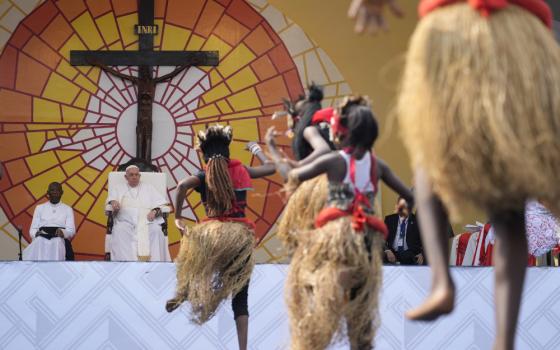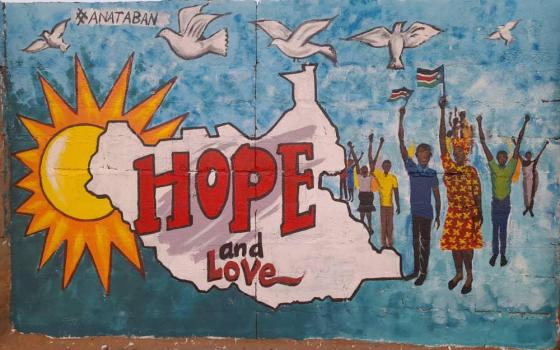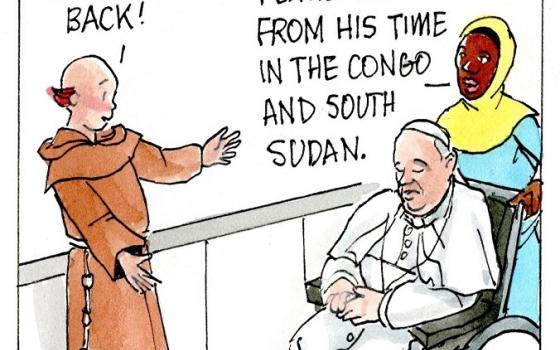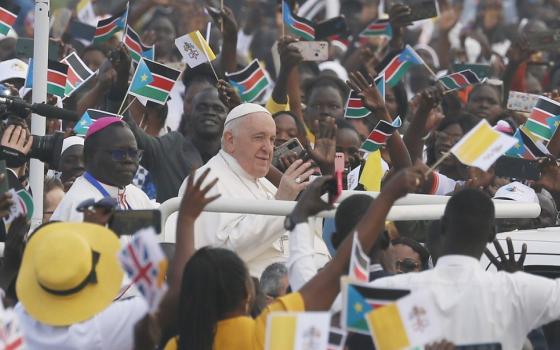Women in Rubaya, Congo, walk past a sign warning against child labor Aug. 14, 2019. (CNS/Reuters/Baz Ratner)
Could the world's smallest state, the Vatican, effectively put pressure on the world's two leading superpowers, China and the United States, during Pope Francis' three-day visit to the Democratic Republic of Congo?
Yes — hopefully — according to some of the country's Catholic leaders who are also environmental experts and advocates.
"There's a race between China and the U.S. because of critical natural resources like lithium, cobalt and copper," said Congolese Jesuit Fr. Jacques Nzumbu. "To win the competition, you need these minerals. And Congo is suffering because of this competition."
The natural resources in the Congo are nearly unrivaled in the world, with its strategic minerals essential to the transition to green energy in the Global North. The forests of the Congo Basin are known as the second largest lung of the planet, after the Amazon, and together with its carbon sink — the largest in the world — are viewed as essential for fighting climate change.
Despite such treasures, Congo is one of the world's poorest countries, where more than 77 percent of the population live below the international poverty line. Over the last three decades, an estimated 10 million Congolese have died due to ongoing wars and armed conflict, including over the country's minerals.
A general view shows miners at an artisanal gold mine near Kamituga, Congo, Aug. 1, 2018. (CNS/Reuters/Djaffar Al Katanty)
"Behind these conflict minerals are businessmen and women, multinationals that profit from war," Nzumbu told Earthbeat. "And behind these multinationals and economic interests, there is the welfare of the Global North at the expense of local people and communities."
Enter Pope Francis, whose Jan. 31–Feb 3 visit to the Congo is expected to highlight a range of issues facing the country.
According to Nzumbu, since the environment has been a central theme of his decadelong papacy, Francis should "denounce the sacrifice and martyrdom of the Congo because of its natural resources."
"The pope can alert the world to this situation, which can only increase suffering and wars in the Democratic Republic of Congo, taking away true peace," he added.
Nzumbu noted that in addition to mining, the country's oil supply and forests are being depleted and that the international community often ignores local mining laws and regulations, which he said deprive local communities of the necessary means of survival.
"Congo has to produce more and more without respect for human rights," he said. Global companies come to Congo to buy its minerals, allowing the developed world to make the transition to green energy through products like electric cars and lithium-ion batteries — as well as other advanced technologies, such as 3D printing, robotics and drones — while Congo fails to receive any gains from the transition, he explained.
"We are proving these things, while meanwhile, at home, we are polluting and we have no light," he said.
In 2007, the Congolese bishops' conference formed its Episcopal Commission for Natural Resources, known as CERN, to influence lawmakers and policies regarding natural resources and mining codes, as well as to better educate the general population about environmental responsibility.
According to Henri Muhiya, executive secretary to the commission, the pope's "moral authority is recognized worldwide," and he hopes that his message to countries targeting Congo's resources is "to trade ethically and fairly."
"For years countries and multinationals protected by their countries of origin have used unfair mechanisms to access the Democratic Republic of Congo's natural resources," he told Earthbeat, describing a long history of corruption, the sale of arms, mining fraud and more.
Muhiya specifically lamented the fact that most miners are not abiding by the 2015 Paris Agreement on climate change.
Advertisement
Nzumbu, who is a specialist in conflict minerals and renewable energy technology, said that a just transition to green energy requires the whole world reject the notion "that minerals are more important than men and women in the Congo."
This, he added, requires embracing a new economic model that puts the human person at the center of the economy.
Nzumbu said that shift would require greater respect to the economic, social and cultural rights of the local communities where mining occurs, an end to exporting raw minerals if the local community does not benefit, and ensuring that the Congolese also benefit from the gains of batteries and renewable energies.
"This new concept also involves getting all children out of artisanal mines, protecting vulnerable women in the mines, giving women access to decision-making positions in mining companies," he added.
While he is aware that a number of priorities top Francis' jampacked visit to the country, he believes "The resistance and resilience of the Congolese people in the face of such a transition must be highlighted."
Francis' visit, he added, building on his encyclicals Laudato Si' and Fratelli Tutti, highlight that "universal solidarity, can be a unique opportunity to underline the impacts and effects of this unjust and de-equilibrated transition beneficial to the Global North, but detrimental to the Congo, which is experiencing a bitter dehumanization."








